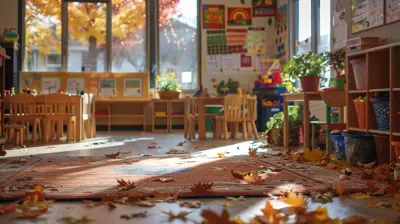The Role of Philanthropy in Filling School Funding Gaps
10 March 2025
Education is often seen as the key to unlocking a brighter future. But while we all agree that investing in schools is crucial for society, the unfortunate reality is that many schools, particularly in low-income areas, are underfunded. This leaves students and teachers grappling with inadequate resources, outdated materials, and decaying infrastructure. So, where does philanthropy come into play? How can generous contributions from individuals and organizations fill the gaps that government funding leaves behind?
In this article, we'll explore how philanthropy is playing a pivotal role in ensuring schools get the support they need, how it impacts students and educators, and why it’s not an ultimate solution but rather a temporary patch to a much bigger problem.

Why Are Schools Underfunded?
Before diving into the role of philanthropy, it's important to understand why schools are underfunded in the first place. Public schools in many countries, including the United States, rely on a combination of state, local, and federal funding. In theory, this should provide enough money to meet the needs of all students. However, the distribution of funds is often unequal.For example, public schools in wealthier areas benefit from higher property taxes, which means more money is available for the school system. On the flip side, schools in lower-income neighborhoods struggle to keep up because they have fewer resources. Compounding this issue is the fact that funding from state and federal governments is often insufficient. Schools are left to make difficult choices—whether that’s cutting extracurricular activities, reducing the number of teachers, or deciding not to upgrade outdated technology.
So, where does philanthropy fit into this equation? Well, it steps in where government funding fails.

The Growing Role of Philanthropy in Education
Philanthropy has long been a part of education, but its role has significantly expanded in recent years. With the increasing gap between what schools need and what they actually receive, philanthropic organizations and individual donors have taken up the mantle of providing financial support. From large donations by billionaires to grassroots community efforts, philanthropy is helping to bridge the gap.Types of Philanthropic Contributions
Philanthropy in education can take on many forms, and it's not just about writing big checks. Here are some of the ways philanthropic efforts get involved:- Grants from Foundations: Large foundations like the Bill & Melinda Gates Foundation or the Walton Family Foundation provide grants aimed at educational reform, technology integration, and teacher training. These foundations often target specific schools or districts that are in dire need of financial support.
- Community Fundraising: Sometimes, the most effective philanthropy comes from the community itself. Local businesses, parents, and even students band together to raise funds for their schools. Whether it's bake sales, charity runs, or crowdfunding campaigns, these efforts can provide much-needed support for schools.
- Corporate Donations: Companies also play a significant role in education philanthropy. Tech giants like Google and Apple, for example, have donated millions of dollars worth of equipment and software to schools, helping bridge the technology gap in underfunded districts.
- Individual Donations: While the big names tend to make the headlines, individual donors also make a huge impact. These donations may be smaller, but when pooled together, they can provide scholarships, fund after-school programs, or purchase supplies that schools desperately need.
Philanthropy and Technology in Education
One of the most tangible contributions of philanthropy in education is in the realm of technology. In today’s digital age, having access to modern technology is crucial for students' success. But many schools can’t afford the latest equipment or software, leaving their students at a disadvantage compared to those in wealthier areas.Philanthropy helps bridge this digital divide by providing schools with the funds to buy new computers, tablets, and learning software. For example, the Mark Zuckerberg-led Chan Zuckerberg Initiative has invested heavily in educational technology. Thanks to this type of contribution, students in underprivileged areas are gaining access to the same learning tools as their more affluent peers.
But it’s not just about gadgets. Philanthropy is also funding teacher training in technology integration, ensuring that educators are equipped to use these tools effectively.

The Benefits of Philanthropy in Education
There’s no denying that philanthropy has had a positive impact on schools. Let’s break down some of the key benefits:1. Filling Immediate Needs
Schools often have urgent needs, whether it’s hiring more teachers, buying new textbooks, or repairing a leaky roof. Philanthropic donations can quickly address these issues, providing immediate relief where government funding is lacking.2. Innovative Programs
Philanthropic funding isn’t just about covering basic needs. It can also fund innovative programs that go beyond the standard curriculum. For example, some donations support STEM (Science, Technology, Engineering, and Math) initiatives, arts programs, or mental health services for students. These programs can enrich students' educational experiences and better prepare them for the future.3. Scholarships
Many philanthropic efforts are aimed at providing scholarships to students who might not otherwise be able to afford higher education. These scholarships open doors for students from underprivileged backgrounds, giving them an opportunity to pursue their dreams without being burdened by debt.4. Encouraging Community Involvement
When local businesses or community members get involved in fundraising for schools, it fosters a sense of community ownership and involvement. This can help build stronger ties between schools and the communities they serve, creating a more supportive environment for students.
The Limitations of Philanthropy in Education
While philanthropy undoubtedly has its benefits, it’s important to recognize its limitations. As much as we appreciate the generosity of philanthropists, it’s not a permanent solution to the school funding crisis.1. Uneven Distribution of Funds
One of the major criticisms of philanthropy in education is that it can create inequities. Wealthier communities tend to have more access to philanthropic donations, whether from local businesses or wealthy individuals. This can exacerbate the divide between underfunded schools in low-income areas and well-funded schools in affluent neighborhoods.2. Short-Term Solutions
Philanthropic donations are often short-term solutions to long-term problems. While an influx of cash can temporarily solve a school’s financial issues, it doesn’t address the root cause of the problem: systemic underfunding. Once the funds run out, schools are often back to square one.3. Influence Over Curriculum
Some critics also argue that large donations from wealthy individuals or corporations can come with strings attached. For example, a major donor may want a school to adopt a certain curriculum or focus on a particular subject, which can skew the educational experience in ways that don’t necessarily benefit all students.4. Dependence on Unpredictable Funding
Relying on philanthropy can lead to instability. Unlike government funding, which (while flawed) is at least somewhat predictable, philanthropic donations can dry up at any time. This leaves schools vulnerable to financial uncertainty.A Band-Aid, Not a Cure
Philanthropy is doing amazing things for schools across the country, but it’s important to remember that it’s a Band-Aid, not a cure. The real solution to school funding gaps lies in systemic change. Governments need to prioritize education and ensure that all schools, regardless of their location or income level, have the resources they need to succeed.Philanthropy can—and should—continue to play a role in supporting schools. But it needs to be seen as a supplement, not a replacement for robust public funding. Until we address the root causes of underfunded schools, we’ll continue to see inequities in education.
How Can You Get Involved?
Even if you’re not a billionaire or a large corporation, there are still plenty of ways you can get involved. Consider donating to local schools, participating in community fundraisers, or even volunteering your time. Every little bit helps, and when communities come together to support their schools, amazing things can happen.Conclusion
Philanthropy has become an essential part of the education system, stepping in to fill gaps created by inadequate government funding. From providing scholarships to funding innovative programs, philanthropy is making a real difference in the lives of students and educators. However, it's not a permanent solution. As we move forward, we must work toward a system where schools are adequately funded through public means, reducing the need for philanthropic intervention.Until then, philanthropy will continue to act as a much-needed bridge, ensuring that students in underfunded schools are given the opportunities they deserve. But let’s not kid ourselves—it’s not enough on its own. We need everyone—governments, communities, and philanthropists alike—to come together and invest in the future of education.
all images in this post were generated using AI tools
Category:
School FundingAuthor:

Madeleine Newton
Discussion
rate this article
15 comments
Azriel McMichael
Philanthropy can significantly supplement school funding, yet it’s essential to ensure equitable distribution and maintain accountability to truly benefit all students.
April 8, 2025 at 4:55 AM

Madeleine Newton
Thank you for your insightful comment! Ensuring equitable distribution and accountability in philanthropy is indeed crucial for maximizing its positive impact on all students.
Graham Kirk
Great read! Philanthropy can truly be a game-changer for schools—let’s keep the support flowing and ideas growing!
April 6, 2025 at 6:57 PM

Madeleine Newton
Thank you! I completely agree—sustained support and innovative ideas are essential for transforming education through philanthropy.
Zia Gill
Philanthropy: Because every school needs a superhero in disguise!
April 5, 2025 at 8:58 PM

Madeleine Newton
Thank you! Philanthropy truly acts as a vital superhero, bridging funding gaps and empowering schools to thrive.
Isaiah Patel
Philanthropy plays a crucial role in addressing school funding gaps, providing essential resources that enhance educational equity and access, ultimately empowering underserved communities to thrive.
April 2, 2025 at 2:19 AM

Madeleine Newton
Thank you for your insightful comment! I completely agree—philanthropy is vital for bridging funding gaps and fostering equity in education.
Mika Hensley
Philanthropy transforms education; every contribution truly matters.
March 30, 2025 at 7:03 PM

Madeleine Newton
Thank you for your insightful comment! Indeed, every contribution can make a significant impact in bridging educational funding gaps.
Vireo McKeehan
Thank you for shedding light on the crucial role of philanthropy in education. It's inspiring to see how collective efforts can bridge funding gaps, ensuring that every student has access to quality resources. This article highlights the power of community support and reminds us of our shared responsibility in nurturing future generations.
March 30, 2025 at 5:30 AM

Madeleine Newton
Thank you for your thoughtful comment! I’m glad the article resonated with you and highlighted the importance of community support in education. Together, we can make a difference!
Evangeline Duke
Oh sure, let’s just ask billionaires to fund our kids’ education—what could go wrong?
March 25, 2025 at 7:16 PM

Madeleine Newton
Philanthropy can complement public funding, but it shouldn’t replace systemic support. It's essential to ensure accountability and equitable distribution in education funding.
Mila Davis
What an intriguing perspective on philanthropy's impact! I'm curious how different funding models influence educational equity and opportunities across diverse communities. Looking forward to more insights!
March 22, 2025 at 9:50 PM

Madeleine Newton
Thank you for your interest! Different funding models can significantly shape educational equity by determining resource allocation, support for underserved communities, and the sustainability of initiatives. I’ll explore these aspects further in future pieces!
Tessa Cooper
Philanthropy plays a crucial role in addressing school funding gaps, providing essential resources for underfunded programs. By supporting innovative projects and ensuring equitable access to quality education, philanthropic efforts can enhance student outcomes and foster community engagement. Collaborative partnerships between schools and donors can drive meaningful change in education.
March 21, 2025 at 9:39 PM

Madeleine Newton
Thank you for your insights! I completely agree that philanthropy is vital for bridging school funding gaps and enhancing educational equity. Collaborative efforts can indeed create lasting positive impacts on student success and community involvement.
Astraea Cook
Every child's future deserves support.
March 19, 2025 at 8:21 PM

Madeleine Newton
Absolutely, supporting every child's future is essential, and philanthropy plays a crucial role in bridging those funding gaps to ensure equitable education for all.
Rayna Thomas
While philanthropy can temporarily bridge funding gaps in education, relying on it risks perpetuating inequality and undermining systemic solutions. Sustainable funding models and equitable policies should be prioritized to ensure every student receives the quality education they deserve, regardless of their zip code.
March 19, 2025 at 12:52 PM

Madeleine Newton
Thank you for your insightful comment! I agree that while philanthropy can provide immediate support, prioritizing sustainable funding and equitable policies is essential for long-term solutions in education.
Ariana McKinley
While philanthropy can illuminate the shadows of educational funding, what hidden motives lurk behind the generous donations? The plot thickens...
March 18, 2025 at 5:42 AM

Madeleine Newton
Thank you for your insightful comment! It's essential to critically examine the motivations behind philanthropic contributions, as they can shape educational priorities and outcomes in unexpected ways.
Damon Thomas
Philanthropy plays a crucial role in addressing educational disparities, yet reliance on private funding can perpetuate inequalities. Sustainable solutions must prioritize equitable funding models alongside philanthropic efforts to ensure long-term systemic change.
March 17, 2025 at 5:25 AM

Madeleine Newton
Thank you for your insightful comment. I agree that while philanthropy is vital, sustainable solutions require equitable funding to address systemic disparities effectively.
Spencer Ford
Philanthropy plays a crucial role in bridging school funding gaps, providing essential resources that enhance educational opportunities and support student success.
March 14, 2025 at 8:46 PM

Madeleine Newton
Thank you for highlighting the vital impact of philanthropy in education! It's essential for addressing resource disparities and fostering student success.
Sari Lewis
Philanthropy: School superheroes in disguise!
March 11, 2025 at 8:07 PM

Madeleine Newton
Thank you! Philanthropy truly plays a vital role in bridging funding gaps and empowering schools to thrive.
MORE POSTS

The Role of Educational Research in Shaping Classroom Practices

Using Peer Feedback to Build Student Confidence in Public Speaking

How to Effectively Manage Time as a College Student

The Impact of AI and Automation on Higher Education

Setting Study Goals That Lead to Achievable Success

Qualitative vs Quantitative Research in Education: Which is Better?

Time-Blocking Techniques: Managing Your Day Like a Pro

The Importance of Ethical Decision-Making in Skill Development

Fostering a Growth Mindset with Reflective Classroom Activities

The Importance of Routines in Early Learning Environments